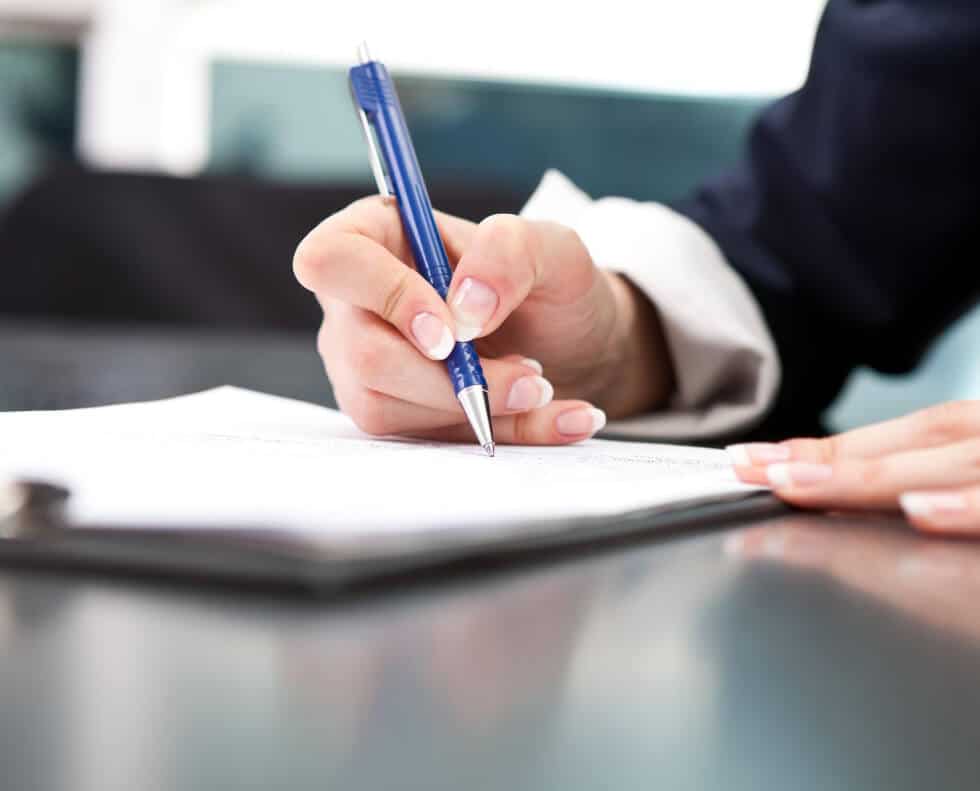When someone files a civil lawsuit, it is common for one or more depositions to take place during the timeline of the case. A deposition is recorded witness testimony that is used as part of the discovery process. Deposition hearings are conducted outside of courtrooms and are commonly held in attorney offices outside of the presence of a judge. If you are a witness to a case, then your deposition testimony can be ordered through the use of a subpoena. If you are planning to file a lawsuit, then make sure you have an experienced lawyer on your side. It can be critical to getting the best outcome in your case.
What is an Oral Deposition
An oral deposition is sworn testimony taken and recorded before trial. The purpose is to discover facts, obtain leads to other evidence, preserve testimony of a witness who may not be available at the time of trial, and establish a witness’s version of events.
Cases are frequently won and lost because of the deposition testimony of a witness. One of the best ways to destroy a witness, for example, is to show contradictions between his trial and deposition testimony. Take your deposition as seriously as you would your testimony at trial. The following guidelines should prove helpful to you.
How are Depositions Conducted?
Depositions are not held in courtrooms typically, but are in the presence of a certified court recorder. The witnesses in a deposition will answer a series of questions by the attorneys on both sides of a case. Truthful answers are expected as a witness under oath will be questioned. Witnesses will be required to answer questions both on direct examination and on cross – examination.
Deposition questions are subject to the rules of evidence and lawyers can make deposition objections to questions. In court, when an objection is made, the answer to that objection is made immediately by the sitting judge. In a deposition, objections are noted for the record, and the witness will answer the objected to question. Deposition transcripts are made once the deposition is completed and the transcripts are used to bring before the judge to determine which questions and answers are appropriate and will be allowed in at trial.
Why Are Depositions Conducted?
Oral depositions are conducted to force witnesses in cases to testify when they might otherwise choose to remain silent. There is no fifth amendment right to remain silent in a deposition as they are civil matters and are not part of a criminal investigation. The fifth amendment applies when the person asking the questions is a government officer and there is possibility of criminal charges from the deposition.
Depositions are ordered as part of the discovery phase of a case and are meant to limit the surprises at trial that can take place. The answers given in depositions can often help resolve cases once all of the information is put out in the open. Depositions are an integral part of civil procedure and are a critical discovery tool for all parties involved.
How Are Depositions Used?
Depositions are used by both sides in civil case as a piece of evidence at trial or in a settlement negotiation. At trial, an attorney can ask a question and use the deposition to impeach your answer and credibility if the answer doesn’t line up with the answer previously given at a deposition. It can be damning in front of a jury if the answer to a question is substantially different at trial than it was at a deposition. These inconsistencies can kill the credibility of a witness and result in a loss for the side the witness is testifying for.
Depositions are also used in settlement negotiations where lawyers can show each other a fair preview of the testimony that would be expected at trial. If the testimony at trial stays consistent with the testimony at a deposition, then it can help both sides get closer to a fair resolution of the case. Courts try to avoid trials when possible, and depositions are a critical part of the litigation process that helps force resolutions to cases.
What to do During a Legal Deposition Hearing
Put your best foot forward.
The examiner will form an impression of what kind of trial witness you will make on the basis of your appearance and performance at the deposition, and that impression may affect the value he puts on the case. Put your best foot forward, be in command of yourself, and be as believable a witness as possible.
Your physical appearance.
You should remember that usually the first opportunity opposing counsel has to see you comes at the time of your deposition. It is important that you make a good impression upon the opposing counsel and his client. You should appear at the deposition dressed as you would expect to dress if you were actually going to court. Uniformed staff members should wear the uniforms that they would normally wear on the job.
Do not spring any surprises on your counsel.
If you are concerned about something that might prove embarrassing, or about something you have done, discuss it candidly with your counsel well before the deposition. Let her decide whether the matter is relevant. Let her help you formulate a response.
Do not bring any materials to the deposition.
Any materials you may wish to bring to the deposition should be specifically reviewed in advance by your counsel and approved by her. Anything you review at the deposition, including personal notes, may be made available to opposing counsel if he asks for it.
Things to Consider During a Deposition Process
Do not be influenced by the examiner’s friendliness, apparent cooperativeness, or courtesy. He is not your friend. Do not be concerned about convincing him about the merit or credibility of your testimony.
Be mindful that this deposition is only one phase of the case. Do not be concerned that all relevant facts have not been elicited by the examiner, or that his questions create a partial picture. We will have a later opportunity to present our own materials, or to clarify your answer on cross-examination.
Use recesses to confer in private. Use recesses to confer with your lawyer in private. If you wish to confer with your attorney, it s best to do so during a break, although you may confer with your attorney at any time. Feel free to request a break if you feel tired or uncomfortable at any point. If your counsel suggests you need a break always agree.
Refrain from discussing personal, sensitive or privileged matters in the deposition room. There is no such thing as a comment “off the record.” If you have a conversation with someone in the deposition room when the examiner is present, be prepared for questions on that conversation.
Be courteous and civil to opposing counsel at all times. Do not argue with him. Avoid any display of hostility. He may try to provoke you in hope that anger will cloud your judgment. Do not let him succeed; keep your temper.
Avoid any attempt at levity. It will appear you are not taking your oath seriously if you make jokes or wise cracks.
Do not agree to undertakings unless cleared first with your counsel. Do not promise to look up information, to obtain materials, to make calculations, etc., unless cleared first through your counsel.
Do not become involved in the arguments of counsel. However, do pay careful attention to what is said, particularly by your own counsel, since this argument may alert you to problems. In general, if your counsel indicates she has some problem in understanding the questions, it should alert you to the possibility that there may be a problem you have not considered. Usually after an argument between the lawyers, you will have forgotten the question or some part of it; feel free to ask the question read back or restated.
Do not be upset by the examiner’s accusation that your testimony is inconsistent with some document, or with another person’s testimony, or with your own prior testimony. It is common tactic for the examiner to suggest an inconsistency when none may exist. Do not let him rattle you.
How to Answer Questions During a Deposition Hearing
Answer every question honestly. You are under oath and intentionally false answers may constitute a crime. Moreover, falsehoods on the most minor or irrelevant points may be used to destroy your credibility on more important issues. Never give false statements.
Answer only the question that is asked. Do not anticipate questions. Do not volunteer information. Keep your answers short. “Yes” and “No” is the ideal answer. When a short answer would be misleading, however, you have a right to explain your answer.
Speak slowly, clearly and audibly. This is important so that the court reporter will be able to take down every word. Let the examiner complete his questions before you begin to answer.
Listen carefully to each question. Be sure you understand it entirely. Do not answer a question you do not understand. Do not hesitate to ask for clarification or for a rereading of the question.
Pause before beginning each answer. Answer slowly. This gives you time to reflect on the question, and it gives time to your counsel to formulate and interpose objections. The written transcript does not reflect how long you take to answer a question or how long your pause. A deposition is not a conversation, but rather a series of questions and answers. Give careful consideration to each question. Stop answering immediately if your counsel starts talking.
Listen carefully to objections. If an objection is raised to the question, listen to the objection very carefully. You may learn about the questions and how it should be handled from the objection.
Where appropriate you may qualify your answers with words such “to the best I can recall,” “my best recollection is,” I believe . . .”. Be as specific or vague as your memory allows. Where you are sure, do not hedge or unnecessarily weaken the force of a strong answer.
Pay particular attention to the introductory clauses preceding the guts of the question. Leading questions may be proceeded by statements which are either half-true or contain facts which you do not know to be true. Do not have the examiner put you in the position of adopting these half-truths or unknown facts on which he will then base further questions.
Do not answer a compound question unless you are certain that you have all parts of it in your mind. If it is too complex to be held in your mind, it is too complex and ambiguous to answer.
Avoid detailed explanations. In answering questions calling for complicated series of events or extensive conversations, summarize where possible. The examiner, if he is doing his job properly, will ask for all the details. It is always possible, however, that the examiner will accept your summary; if so, so much the better.
You only know what you have seen or heard. Questions are often phrased “Do you know . . .”. A question on deposition may legitimately call for something you do not know, but it must be so phrased There is a difference between a question which states “Do you know,” and a question which asks whether you have any information bearing on a particular subject.
Indicate whether you are paraphrasing or quoting. In testifying regarding conversations, make it clear whether you are paraphrasing or quoting directly.
Avoid absolutes unless you are positive they are accurate. I “never” or I “always” have a way of coming back to haunt you.
Do not guess, or offer an opinion. If you do not know the answer, simply say so. Do not venture an opinion unless it is specifically called for and then only after giving your counsel an opportunity to object.
Stay within your own realm. Stick with what you know. Do not hesitate to say that you do not know. Do not volunteer who might know.
On complicated or difficult questions, you may state that you need time to consider before answering.
As long as you are satisfied with your answer, do not be concerned whether the examiner understands or seems to understand what you are saying. If, on the other hand, your counsel indicates some problem with your answer, very carefully rethink it. You may ask at any point for a question or answer to be read back to you. If on further reflection, you are still satisfied with your answer, you can consult with your attorney.
If you are interrupted, say so. If you are interrupted, let the lawyer finish his interruption and then firmly but courteously state that you were interrupted, that you had not finished your answer to the previous questions, and then complete your answer.
Think before accepting the accuracy of the examiner’s statement. Do not let him put words in your mouth. Do not assume that the examiner has accurately described your prior testimony or that of another witness or a document when he purports to do so. Give your counsel time to object to any inaccuracy.
Do not feel compelled to speak simply because there is a moment of silence. Sometimes, after you give an answer, there will be silence. The other lawyer may be thinking how to word his next questions. Silence sometimes makes a witness uncomfortable. You may be tempted to fill the silence with words. Do not. Keep quiet and wait.
If instructed or advised not to answer by your counsel, do not answer even if you believe the answer would be helpful.
If you realize that your earlier answer was in error or incomplete, you should correct or supplement it. You should not say that an earlier answer is true if you become aware that it is not.
If you are hit with a flash of insight, resist volunteering it. If you are hit with a flash of insight or recollection while testifying and this information has not been previously discussed with your counsel, hold it to yourself, if possible, until you have an opportunity to review it with counsel.
If asked about a document read it carefully before you begin to answer. If you do not recall the document, or do not know to an absolute certainty what its author meant, say so. Do not guess as to what may have been meant.
Expect to be asked what you have done and what files you have examined in preparation for your deposition. This includes any financial arrangements concerning your appearance. Discuss this subject with your counsel before the deposition.
What If I Choose Not To Testify At a Deposition?
If you are subpoenaed to testify at a deposition, then choosing not to testify can have severe consequences. In Washington, a refusal to testify at a deposition can result in being held in contempt of court under Court Rule 37. You can be ordered to pay the expenses incurred as a result of the refusal, along with attorney fees. A refusal to testify can also result in certain evidence not being admitted and can even result in a default judgment for a party in the case. There are certain circumstances under Court Rule 26 where a witness can show good cause to avoid testifying at a deposition. If you have been served a subpoena to testify at a deposition, then make sure you speak to an attorney before you decide whether to testify or not.
Sofia’s No Fee Guarantee
Attorney Sofia K. Miguel guarantees that you will never write a check to our law firm under Sofia’s “no fee guarantee.” Consultations are free and if your case is selected, then Sofia will also cover all your court costs incurred during your personal injury case.
Sofia only gets paid when you do. Her services will cost you nothing out of pocket; simple as that. Let Sofia’s nearly twenty years of experience in helping people recover from their injuries get to work for you now.
If you or a loved one has suffered an injury due to an accident near Seattle, Puyallup, or Tacoma, WA, then contact us for an initial consultation with Sofia Miguel as she is ready to help you fight to get the money you deserve. Call us at 253-200-4471, come visit our office right here in Puyallup at 702 S. Hill Park Dr. #207, or contact us online anytime. We are here for you.






0 Comments